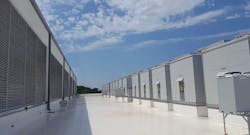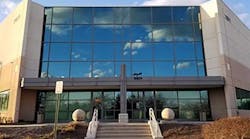MANASSAS, Va. – CloudHQ knows how to make an entrance. This week the company plans to deliver on the largest lease in the history of the data center industry, presenting an anchor tenant with 35 megawatts of space at its Manassas Corporate Center.
The massive new building marks an auspicious debut for CloudHQ, the newest player in the Northern Virginia data center scene. The 460,000 square foot MCC1 facility can support more than 43 megawatts of data center space, allowing the company to house its anchor tenant and an additional 8 megawatts of multi-tenant space.
CloudHQ marks the return of Hossein Fateh, one of the industry’s master builders. As co-founder and CEO of DuPont Fabros Technology, Fateh built more than 260 megawatts of data center capacity for many of the leading players in the Internet sector. Fateh stepped down from DFT in February 2015, and took a year off from the industry. In May 2016 Fateh launched CloudHQ, and secured a huge lease with a leading hyperscale customer.
The new company has taken a stealthy approach thus far, and hasn’t even launched its web site yet. But CloudHQ comes to market with an experienced team and relationships with marquee tenants.
“There’s no big need for us to be splashy,” said Jeramy Utara, Vice President of Sales & Leasing for CloudHQ. “Our business strategy is a little different. We would like to be more of a development partner for our major clients. We don’t build on spec. We build new buildings with an anchor tenant, and we work with the largest hyperscale providers.”
Development Partner for the Cloud Titans
CloudHQ arrived on the scene just as cloud service providers were super-sizing their requirements, seeking leases of 16 megawatts and above. It has the potential to be a disruptive player in the “super wholesale” market, and plans on working with the major cloud service providers on build-to-suit projects.
“It’s a custom build. If you’re an anchor tenant, you get an early seat at the design table,” said Utara, who said CloudHQ hopes to work with anchor tenants seeking 20 megawatts of capacity or more.
As it rolls out its offering, CloudHQ is focusing on Manassas, an emerging data center hub in Prince William County, about 20 miles south of “Data Center Alley” in Ashburn. CloudHQ owns property near Manassas Regional Airport, supported by Dominion Virginia Power’s Clover Hill substation, which has 300 MVA of capacity. The company built eight miles of fiber conduit along Route 234 to bring connectivity to the campus.
The exterior of the CloudHQ MCC1 data center in Manassas during the late stages of its construction and commissioning. At right is the massive Dominion Virginia Power substation that will support the campus. (Photo; Rich Miller)
One of CloudHQ’s strengths is an experienced team that has worked together on delivering large data center projects. Nearly the entire CloudHQ team worked together with Fateh at DFT, including Utara, VP of Information Technology Dan Molloy, VP of Design & Construction Brian Zemcik, VP of Sales Engineering Faran Kaplan, VP of Electrical Infrastructure Brian O’Hara, and Bob Rosenberger, the EVP of Operations.
Capturing Economies of Scale
Like DFT, CloudHQ is focused on building big and capturing economies of scale that can reduce the cost of construction – which in turn allows it to pass savings along to customers. It operates under the wholesale data center model, with customers leasing entire data halls rather than renting capacity by the cage or cabinet, as seen in “retail” colocation.
The MCC1 building is 1,100 feet long, and spans 460,000 square feet. In addition to the anchor tenant, the building includes space for additional data halls with flexible configurations for size, density and resiliency. There’s also the CloudHQ NOC and offices, and additional office space for tenants.
To ensure uptime, MCC1 is supported by 28 Cummins backup generators, backed by 200,000 gallons of fuel stored on site in four huge tanks, enough to operate for 48 hours. The facility’s power rooms feature equipment designed to reduce hazard exposure from arc flash events.
One of the 28 Cummins 2750kV backup generators at the CloudHQ Manassas Corporate Center 1 data center. (Photo: Rich Miller)
Like DFT, CloudHQ uses an ISO parallel power design that allows load sharing across multiple data halls while allowing each tenant to be isolated from electrical faults, effectively providing a dedicated electrical service. MCC1 uses a medium voltage power distribution system that reduces cost in the feeder system, as well as limiting power loss from voltage conversions.Some of the wholesale space at MCC1 is being offer as low-resiliency space, which operates without generator or UPS support, and is typically used for applications that are not mission-critical.
“We are getting hyperscalers asking for it, typically for specific products like cold storage,” said Utara, who said Cloud HQ’s lower-resiliency space will be available at a meaningful discounts to traditional N+1 or 2N space.
One of the power rooms at CloudHQ’s new Manassas data center, seen during late stages of construction. The equipment includes features to protect workers from arc flash incidents, including hardened exterior and an interior design that channels energy upward, rather than outward. (Photo: Rich Miller)
A key design principle for CloudHQ is operating “waterless” data centers, using only enough water to support bathrooms and humidification systems. To accomplish that goal, it has become a major user of Kyoto Cooling, also known as a heat wheel. It’s a refinement of existing approaches that take advantage of outside air to improve cooling efficiency and reduce data center power bills.
The heat wheel eliminates the need for chillers in most operating conditions, but offers advantages over direct fresh air cooling. The system can work without water, which reduces a data center’s impact on the local utility infrastructure.
One of the long hallways inside the CloudHQ MCC1 data center during final phases of construction. The building is 1,100 feet long, or about the size of a Nimitz class aircraft carrier. (Photo: Rich Miller)
CloudHQ has 152 of the Kyoto Cooling 400kW units mounted on the roof of its Manassas data center. The heat wheel spins at 6 rotations per minute, using ambient air to cool the wheel, which then passes through a second chamber and cools the supply air for the data center.
The cool air from the rooftop Kyoto units at MCC1 is dropped into data halls through openings in the ceiling. Each data hall features a slab floor, with cabinets housed in containment systems with chimneys to vent server exhaust heat into a ceiling plenum.
Water conservation is a growing priority for hyperscale data centers and their customers, who have been seeking to move away from evaporative cooling systems. CloudHQ estimates that a large data center can use as much as 191 million gallons in a year, the equivalent of water used by 5,300 houses.
That type of usage can have an impact on a municipalities’ potable water supply, which is why the Kyoto units are being used by CloudHQ, along with other providers including RagingWire Data Centers, QTS Data Centers and Compass Datacenters.
CloudHQ says it expects MCC1 to operate with a PUE (Power Usage Effectiveness,a leading metric for energy efficiency) below 1.2, consistent with the power efficiency goals of leading hyperscale providers.
Ready to Compete
CloudHQ’s arrival brings another experienced player into the market for hyperscale data center projects. The company is ramping up at the same time that DFT, one of the leading players in the super wholesale market, is in the process of being acquired by rival Digital Realty.
Utara said CloudHQ’s approach is designed to keep costs low and compete hard for projects for cloud providers. The company currently has about 25 employees.
“We’re a private company,” said Utara. “We are a small team, and we prefer to stay small and nimble.”[clickToTweet tweet=”CloudHQ says going waterless can save 190 million gallons in a year, the equivalent of water used by 5,300 houses.” quote=”CloudHQ says going waterless can save 190 million gallons in a year, the equivalent of water used by 5,300 houses.”]
Although CloudHQ includes some elements of a build-to-suit project, that won’t always mean a single-tenant deal. “We’re perfectly fine with single tenant,” said Utara. “Some of our tenants prefer not to be in a single-tenant scenario.”
CloudHQ doesn’t discuss the identity of its anchor tenant. Several reports on data center real estate have identified the tenant as Microsoft. Suffice it to say that a 35-megawatt requirement is in the realm of only the very largest users of data center space, including the leading cloud platforms. While there have been several individual data center leases exceeding 20 megawatts, we’ve haven’t seen deals larger than CloudHQ’s initial customer.






